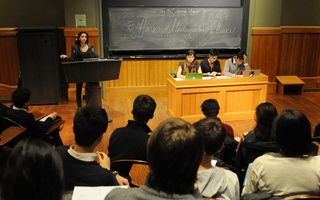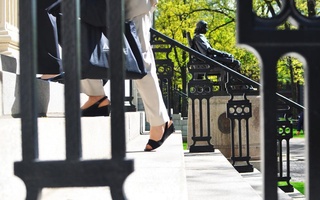LIVING THE SLOGAN
Raghuveer and Zhu earned the UC presidency on a platform that sought to “demand relevance.” In their first semester at the helm of the organization, they have concluded that they can only be relevant to the student body by more aggressively pressuring administrators in response to undergraduate concerns.
In February, when an anonymous Crimson op-ed written by a student with schizophrenia sparked the organization of a rally urging the University to take action on mental health, Raghuveer sent an email urging students to join her at the gathering.
“If ever the UC were to ‘demand relevance,’ it would be acting on this issue,” Raghuveer said at a UC general meeting several days later, where the Council voted to pass legislation calling for mental health dialogue.
These two events set the stage for a UC-sponsored mental health town hall in early March, where Harvard affiliates were given the chance to ask questions directly to representatives from Student Mental Health Services and the Administrative Board.
Pollack said he thinks the Council’s visible and vocal responses to campus mental health activism and the events in the week following the Boston Marathon bombings have spurred positive discussion among students about the Council, something he has never seen before.
“I can personally say, as the person that runs the Facebook page, we’ve gotten more shares and likes than we’ve ever gotten,” Pollack said.
Kate E. Meakem ’14, president of Phillips Brooks House Association, said that although the wide diversity of interests within the student body makes it difficult to clearly determine a single definition of relevance, she personally believes Raghuveer and Zhu have put the UC more in touch with student concerns.
“[Tara and Jen have] been purposeful in making sure that student voices are heard, especially for greater awareness on mental health issues and sending out that email during the Boston bombings,” Meakem said.
DIFFERENT APPROACH, SAME RESULTS
Administrators say they listen to students and make changes based in part on what they hear.
“College administrators meet with the UC leadership regularly, and we are in almost daily contact,” Jeff Neal, a spokesperson for the Faculty of Arts and Sciences, wrote in an emailed statement. “At the same time, the College reviews policies and procedures after every incident or issue and makes adjustments based both on student feedback and on these regular evaluations.”
According to D. E. Lorraine Sterritt, the College dean for administration, Dean of the College Evelynn M. Hammonds maintains close contact with the UC.
“She meets regularly with the leadership of the Undergraduate Council to confer on their initiatives and to understand the priorities of the student body as expressed through that organization,” Sterritt wrote in an email.
But often times, these conversations do not lead to administrative action.
Read more in College News
A Freshman Drinking ProblemRecommended Articles
-
Raghuveer-Zhu Seek UC RelevanceAs they face off against three other tickets, Raghuveer and Zhu are hoping that their organized campaign, diverse experience, and promise to make the UC more relevant will be enough to win them the election.
-
Raghuveer-Zhu Win UC PresidencyTara Raghuveer ’14 and running mate Jen Q. Y. Zhu ’14 won this year’s Undergraduate Council presidential election with a clear majority of votes, the Election Commission announced Friday night.
-
Student Task Force Report Examines University Gun PolicyA focus group of Undergraduate Council representatives released a report early this month examining the University’s policies on guns, discussing the history of gun-related incidents on campus, and recommending policy actions to prevent campus shootings.
-
 UC Discusses New Website, Study Break Funding
UC Discusses New Website, Study Break Funding -
 At Meeting, Faculty Question Relationship With Administrators
At Meeting, Faculty Question Relationship With Administrators -
OSAPR Director To Depart for MITSarah Rankin, the administrator who expanded programming aimed at educating students about sexual prevention and awareness, will depart Harvard at the end of the month to fill the recently created position of Title IX Investigator for MIT.













